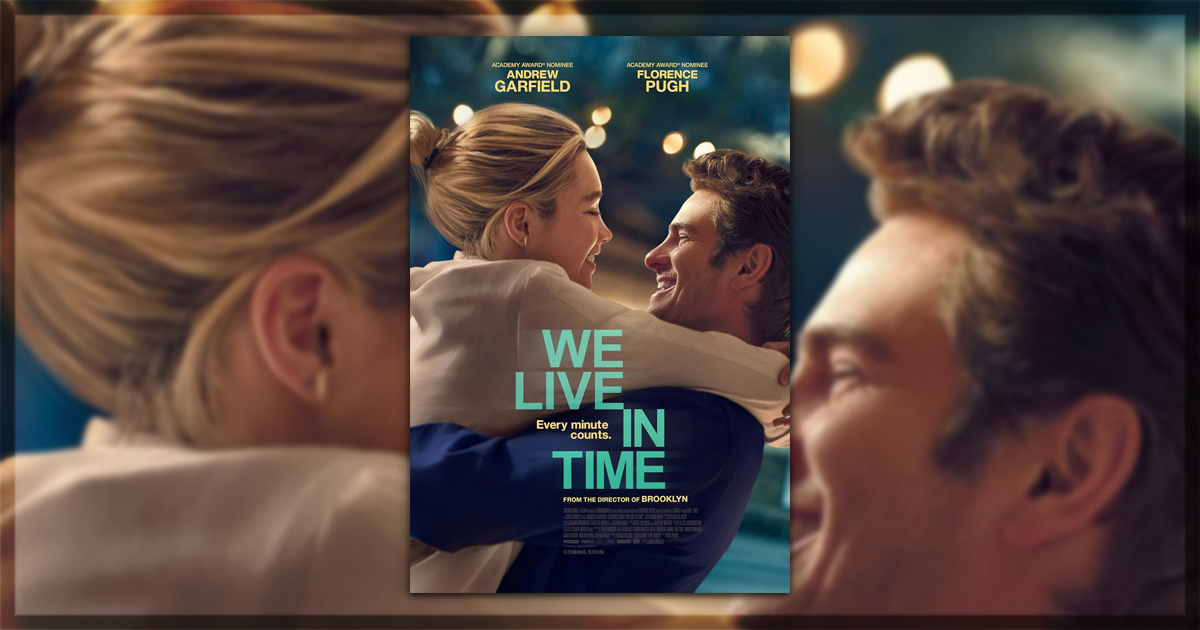Just as there’s a thin line between love and hate, there’s a thin line between romance and horror. What from one perspective shows love conquering all can also be seen as a person (usually a woman) having to deny their career, their sexuality and their independence in order to be accepted. What begins as a single bad romantic choice becomes a pressure cooker of misery. Not to generalise, but We Live in Time is a male fantasy about how an ordinary guy can bully a woman into renouncing everything that makes her unique and interesting to stay at home with their child. For women, therefore, We Live in Time is a horror story. And one which needs plenty of spoilers to discuss properly, so be warned! Although there were so many spoilers in the trailer, if you’ve seen it, you can probably guess where this is going.
Almut (Florence Pugh) is a British woman with an unusual German name who lives in south London, where she is a Michelin-starred chef who owns her own restaurant. Tobias (Andrew Garfield) is the IT guy for a cereal company who lives with his father (Douglas Hodge) while he completes his divorce. Their relationship begins thanks to an accident which is totally Tobias’s fault, but the movie’s non-linear storyline begins with the couple getting the news that Almut’s cancer is terminal. Love Story began the same way, with the news that the girl was already dead, but compared to this, Love Story is a feminist masterpiece. Here the story swings between the early stages of their relationship and how Almut chooses to live her final months: on her own terms, preparing for a major international cooking competition. But she does this in secrecy, because her so-called supportive partner wants Almut to focus on their family – they have a three-year-old daughter. But even though Tobias doesn’t agree, Almut is adamant that she is more than just a mother.
Looking at things from Almut’s point of view, this competition is her last chance to assert her true self. She is not only bisexual but her most serious relationship before Tobias was with a woman. Her relationship with Tobias began thanks to her guilt over the accident and only continued because of her diagnosis. They have repeated arguments over his refusal to keep dating her unless she’s prepared to have his children. In real life when women get a diagnosis of serious illness, their partners commonly react by dumping them, so Tobias is markedly unusual, maybe even controlling, by reacting to the awful news with a marriage proposal. Almut accepts by saying “In for a heteronormative penny, in for a pound,” which is not exactly enthusiastic. And her cancer is ovarian, in case the message of Tobias’s saintliness wasn’t subtle enough.
The movie’s longest linear sequence, of the birth of their child, ends up being nearly slapstick. So many things go wrong; their daughter is born in a petrol station bathroom. Tobias and the male attendant stare in befuddlement as the female attendant (Kerry Godliman) coaches Almut through it. In the years following, Tobias repeatedly complains about Almut’s work and how she refuses to prioritise their daughter exactly how he thinks she should. And then Almut vanishes, without so much as a shot of her tombstone, and Tobias gets to be alone with the child he wanted without the partner he didn’t.
Director John Crowley, whose beloved adaptation of Brooklyn remains unusual in how it centers a woman’s choices, and screenwriter Nick Payne have not made a romance. Instead their story is about how a woman has every part of her self stripped away first by disease and worst by the person who’s meant to love her the most. Jane the petrol station attendant has more lines and a greater personality than Almut’s only friends, Skye (Aoife Hinds) and Jade (Lee Braithwaite), neither of whose names we learn until very late in the movie, and who both are her employees. Even in the busiest group scenes, it’s rare for anyone other than Tobias and Almut to have dialogue. Fortunately for the filmmakers, Ms. Pugh does significantly better work than her part deserves.
For his part, Mr. Garfield spends the first half of the timeline looking thunderstruck, then the second half using the same facial expression to express anger, self-pity or love. The score, from The National’s Bryce Dessner, smears a layer of starry-eyed feeling over Stuart Bentley’s gauzy cinematography, both of which force the sense of romance Mr. Crowley was desperately aiming for. Editor Justine Wright does a good job of keeping the shifting timeframes clear, but nothing can compensate for the torture Almut endures. That’s a strong word for a heterosexual relationship, but it’s hard to reconcile what the movie itself tells us about what Almut wants and what life with Tobias provides. Would Almut have been happier in the end if she and Tobias hadn’t reconciled at the baby shower? Signs point to yes.
But to maintain some perspective, We Live in Time is only a representative of the failings of a heteronormative society which values women only when they have caring responsibilities. We all know women without partners and/or children are seen as suspect, sometimes even deviant, especially when their sexuality doesn’t center men. Art which punishes clever career-minded women like Almut of any sexuality by the cliché of killing them off is heartless as well as uninteresting. It’s also a warning to the women watching who think they are valued by men for more than their wombs. For those women, including this critic, this is a horror in art and life, and in neither case can it be recommended.
We Live In Time is now available on digital and on demand.
Learn more about the film, including how to rent or purchase it, at the A24 website for the title.
You might also like…
Netflix’s ‘Our Little Secret’ Transcends Holiday Rom-Coms (Review)


